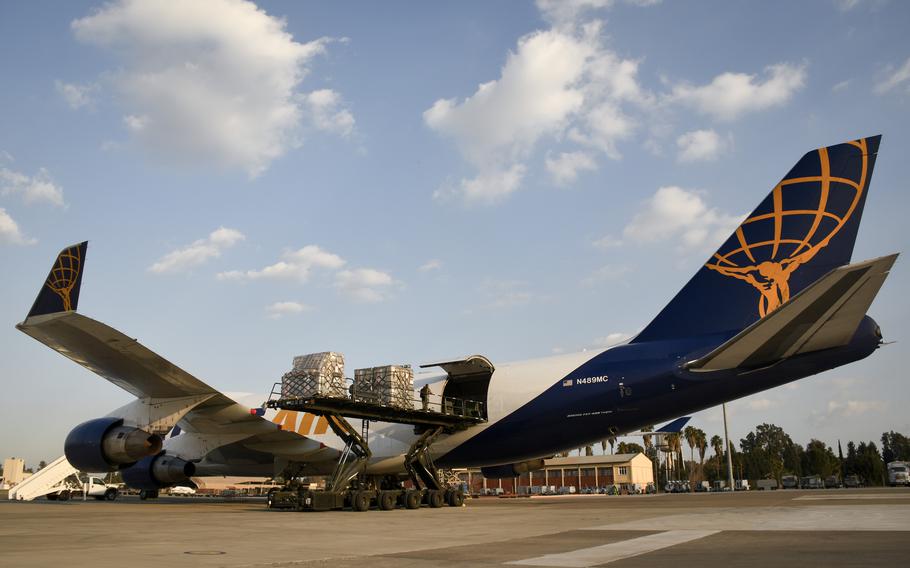
Airmen unload pallets of humanitarian aid, including medical beds, from a cargo plane at Incirlik Air Base, Turkey, Feb. 22, 2023. The aid is part of relief in the aftermath of the Feb. 6 earthquakes that have since left at least 46,000 dead in Turkey and Syria. (J.P. Lawrence/Stars and Stripes)
INCIRLIK AIR BASE, Turkey — The boxes being moved from the flight line by U.S. airmen, in the aftermath of one of the worst natural disasters in decades, are a window into a global outpouring of humanitarian aid: medical equipment from Texas, blankets from China, sleeping bags from Kazakhstan.
The base, a small outpost about 8 miles from Adana in the country’s south, was once known mainly for hosting Cold War spy planes and, according to widely cited unofficial reports, nuclear weapons.
But since the Feb. 6 earthquakes and aftershocks that struck Turkey and Syria, leaving at least 46,000 people dead and many injured, Incirlik has become the central hub for worldwide disaster relief to Turkey, with the U.S. alone pledging $185 million in aid.
The pace of relief efforts has slowed in the weeks after the initial earthquakes, but the commander of the air wing on base said he expects aid distribution to continue far into the future.
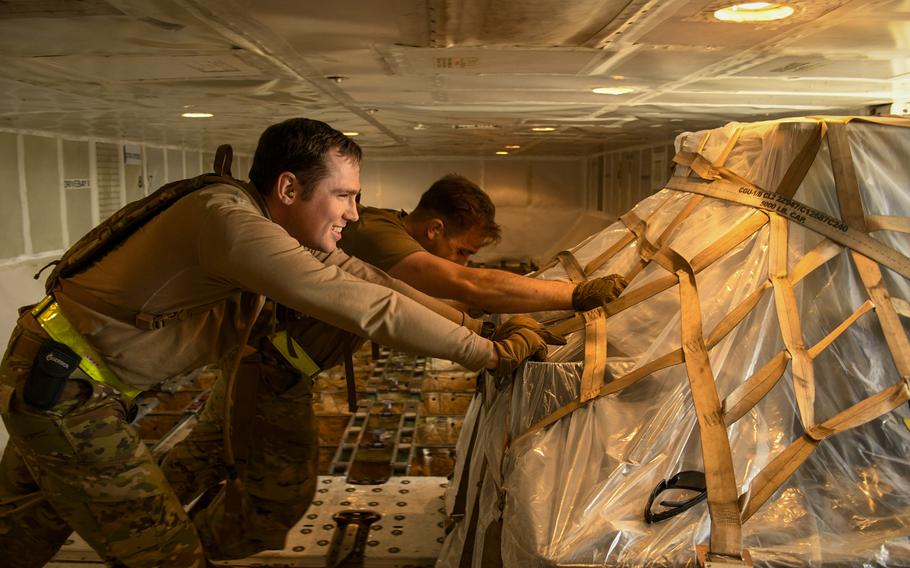
Senior Airman Robin Mercer and Staff Sgt. Colton Panizo push a pallet of humanitarian aid off a cargo plane while deployed to Incirlik Air Base, Turkey, Feb. 22, 2023. Mercer, normally assigned to the 721st Aerial Port Squadron in Ramstein Air Base, Germany, deployed to Turkey on short notice in the aftermath of the Feb. 6 earthquakes. (J.P. Lawrence/Stars and Stripes)
“It won’t stop for months, if not years,” Col. Calvin Powell said Thursday in an interview. “As long as the Turkish government chooses to use Incirlik Air Base as a primary port for inflow of aid from outside the region and distribution to within the region, the 39th Air Base Wing will be integral to that operation.”
Incirlik sits about 125 miles away from the epicenter of a 7.8 magnitude quake that struck in the early morning hours of Feb. 6, followed by a 7.5 magnitude earthquake that hit nine hours later.
The earthquakes leveled houses across the region and killed more than 40,000 in Turkey and almost 6,000 in Syria, said a report Tuesday by the Los Angeles-based International Medical Corps.
More than 1 million people in Turkey are now living in tents, Turkish Vice President Fuat Oktay said last week, according to The Guardian. And as many as 26 million people in Turkey and Syria may need humanitarian assistance over the coming years, the World Health Organization stated last week.
Secretary of State Antony Blinken told reporters at the base Sunday that the widespread devastation from the quakes will require a huge effort to rebuild but that the U.S. is “committed to supporting that effort.”
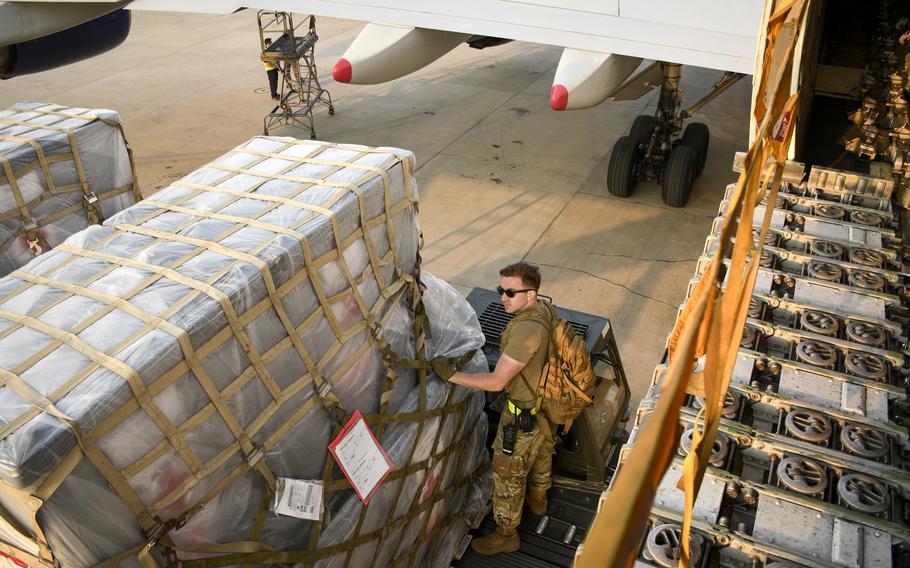
Staff Sgt. Colton Panizo, an air freight supervisor deployed to Incirlik Air Base, Turkey, unloads pallets of humanitarian aid meant for earthquake survivors in Turkey. The Feb. 6 quakes have left at least 46,000 dead in Turkey and Syria. (J.P. Lawrence/Stars and Stripes)
Thus far, these efforts have seen airmen, working with Turkish troops and volunteers, unload 423 aircraft filled with 13,374 tons of food, supplies and equipment since Feb. 6, the Air Force said Thursday in a statement.
The base also has welcomed 4,234 troops and civilian aid workers from around the world, as well as 36 rescue dogs since the earthquake, the Air Force statement said.
This influx of personnel includes Marines and sailors from Task Force 61/2, who coordinate with the U.S. Agency for International Development. Army helicopters are among the 15 U.S. rotary aircraft flying aid missions from Incirlik.
Airmen at the base recalled being awakened by the first Feb. 6 earthquake, followed by the frantic rush to process the arriving aid.
At first, the constant stream of aircraft dropped off aid so quickly that it overwhelmed the resources troops had to distribute it, recalled Tech Sgt. Jacob Siluano, the sergeant in charge of aircraft services for the 728th Air Mobility Squadron.
“We were not anticipating something as big as this magnitude,” Siluano said.
The unit normally services one or two aircraft a day. Since the earthquake, they’ve handled five times the number of aircraft they’d normally get in a whole year, Siluano said.
The unit used to take a 12-hour shift to get 12 trucks out the door and into the disaster zone but now it can process 90 trucks in that time, he said.
What changed was an influx of airmen from across the world who were flown in, often on short notice, to help with unloading planes. These reinforcements brought forklifts and other heavy equipment.
The U.S. military also doubled their available space for loading trucks by using the “Ring of Fire,” an area normally used to train firefighters.
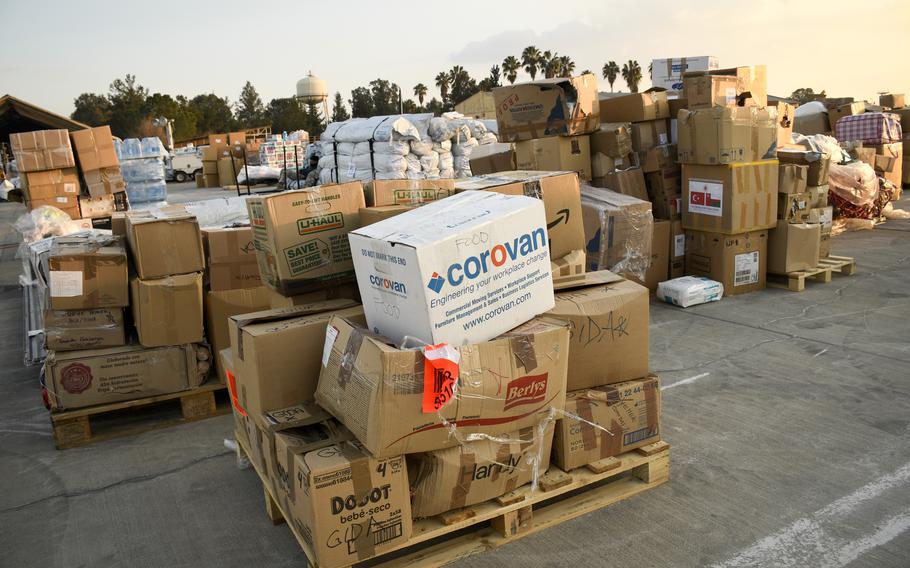
Boxes of humanitarian aid at Incirlik Air Base, Turkey, await pickup on Feb. 22, 2023, for transport to survivors of the earthquakes that have devastated the region. Labels on the boxes indicated they contained items such as tents, generators and food, with origins ranging from San Antonio, Texas, to Shenzhen, China. (J.P. Lawrence/Stars and Stripes)
About 1,080 Turkish citizens work with U.S. troops on Incirlik Air Base, the air wing said.
While the air base escaped significant damage, the earthquake rocked Adana, which has a metro population of about 1.8 million, and displaced many of Incirlik’s workers, said Mehmet Birbiri, the local adviser for the air wing’s public affairs office.
Turkish workers on the base, who were given time off after the disaster, are starting to come back to work this week. Some bring their children because their schools are too damaged to hold classes. One shopkeeper told Stars and Stripes he was mourning a friend and his family, who died in the disaster.
Birbiri recalled the shock of rushing out of his apartment on Feb. 6, running down nine flights of stairs with his wife, and having to leave his home after the earthquake.
Many of the workers on base are afraid another earthquake will strike the area, he said. On Monday, a magnitude 6.3 aftershock hit southern Turkey, just as many citizens were ready to return to their homes.
“We might look physically OK, but mentally we are not good,” Birbiri said.
While talking in his office, he turned on a nearby television. The first thing on was news coverage of the devastation outside Incirlik’s walls.
He said he wonders how long it will take for the area to feel safe again.
“You see a storm, it’s coming, and it passes,” Birbiri said. “But here, this earthquake, we don’t know how long it'll last.”
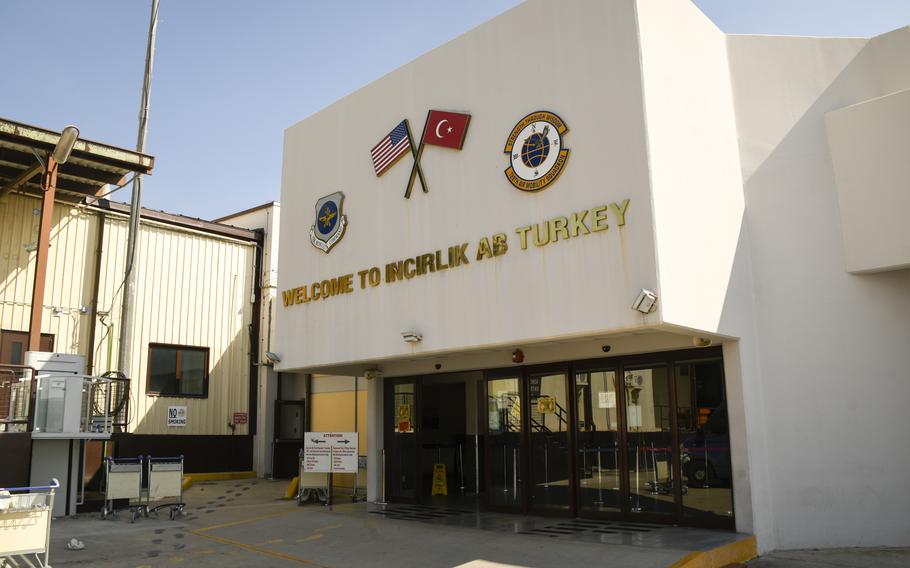
Incirlik Air Base in Turkey has become a logistical hub for millions of dollars of U.S. and international humanitarian aid in the aftermath of the Feb. 6 earthquakes that struck Turkey and Syria. (J.P. Lawrence/Stars and Stripes)